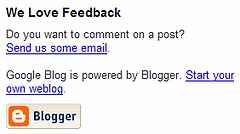Finally, the iPod Week is gone, Techmeme becomes Techmeme again. Unless… it’s becoming Yahoo week.
Wired’s How Yahoo Blew It piece is in the top spot for now, and I expect within hours blog reactions to it will take up half of Techmeme. Perhaps Gabe needs to develop some sort of overload safety valve to prevent one subject from overtaking the entire site…
Anyway, mine may be perhaps the shortest summary of the article – actually, it’s not even mine, Wired’s Fred Vogelstein sums it up for us:
“At Yahoo, the marketers rule, and at Google the engineers rule. And for that, Yahoo is finally paying the price.”
OK, that’s the conclusion, but read the story for the juicy bits.

Finally, a “contrarian” take from Brad Feld, who reminds us Yahoo isn’t dead yet and may just have a real shot with Panama.


 I agreed to be on the Selection Committee for the next full-day
I agreed to be on the Selection Committee for the next full-day  Track – Time, Expenses, Budgets, Accounting, HR
Track – Time, Expenses, Budgets, Accounting, HR ) there are still a few days left for new submissions, so if you know a startup in the above categories, please recommend them either in a comment below or by
) there are still a few days left for new submissions, so if you know a startup in the above categories, please recommend them either in a comment below or by  We now have
We now have 
 Not mentioning
Not mentioning  The Panel:
The Panel:
 (Updated)
(Updated) .
. They claim they love feedback: but the only way to leave feedback is by emailing them. Hm, not much of “love” here, if you ask me.
They claim they love feedback: but the only way to leave feedback is by emailing them. Hm, not much of “love” here, if you ask me.

Recent Comments